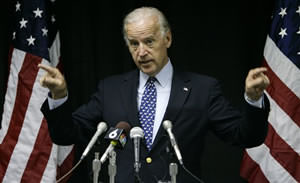Biden One-Ups Bush
It's not just Bushie loyalists and Republicans who are gunning for more money to be poured (out of taxpayers' pockets) into the Iraq war chest. Take Sen. Joe Biden (D-Del.), who is aiming to double Bush's proposed $12 billion in funding for the rapid production of mine resistant ambush protected (MRAP) vehicles -- a proposition which, Scheer argues, is about much more than the security of U.S. troops.
In for a penny, in for a pound. What the heck — the wars in Iraq and Afghanistan have already soaked up $808 billion, so why quarrel about the Bush administration’s request this week for $50 billion more in supplementary spending? That’s on top of the $141 billion in supplementary spending already added to the 2008 budget for the Iraq disaster.
Understand that “supplementary” means, in this case, an allocation of funds beyond the $750 billion that U.S. taxpayers spend each year on the regular defense budget. And that’s a conservative estimate made by former Assistant Secretary of Defense Philip Coyle in an interview on Truthdig. As Coyle points out, this is money spent largely without significant oversight, particularly during the years after the 9/11 trauma heightened the already irrational evaluation of our national security needs.
The full extent of this irrationality can be seen in the response of Sen. Joe Biden (D-Del.), chairman of the Foreign Relations Committee, to the administration’s latest funding request. This leader of the loyal opposition rises, not to criticize Caesar, but to one-up him. The panic button that Bush is using this time is the need for more mine resistant ambush protected (MRAP) vehicles, fortified troop carriers that cost a million bucks a piece but evidently provide better protection against roadside bombs. Bush wants to spend about a quarter of the new money on the rapid production of MRAPs — a mere $12 billion. But that’s not good enough for Biden, who introduced legislation to increase spending on MRAPs by $23.6 billion, arguing, “We have no higher obligation than to protect those we send to the front lines.”
Actually, Senator, you do have a higher obligation: to think through the need for this mission before you vote to put troops in harm’s way, as you failed to do when you voted to authorize the Iraq war. Also, before you rush to create new bottlenecks in the assembly line of the military-industrial complex, producing vehicles that would not be needed if we got out, you might heighten your efforts to force an end to this war. Spending $23.6 billion on fortified vehicles that will take years to produce is an admission that you are planning a long-term occupation of a hostile population in Iraq, and possibly Iran. Recall that Gen. Dwight Eisenhower was able to tour France and Germany in an open-air jeep, waving at friendly crowds, to fully comprehend the different reception Bush gets in what he still calls “liberated” Iraq.
The MRAPs are needed only as a weapon of choice for an occupying army in a country that strongly resists foreigners. If the Iraqis had greeted us as liberators, as Biden and other hawks anticipated, then they would be throwing flowers at our troop carriers rather than being complicit in planting the bombs that destroy them. Fortified vehicles only further separate the occupier from the population, which will remain fully vulnerable to attack. The emphasis on the protection of the foreigner — the Green Zone model — is a failed tactic of colonizers that alienates the local populace.
The locals are alienated enough. In a recent BBC/ABC poll, a whopping 80 percent of Iraqis said that the U.S. and other coalition forces have done “quite a bad job” (32 percent) or a “very bad job” (48 percent) in carrying out their responsibilities in Iraq, and that includes the supposedly happy Kurds. The same poll found that 72 percent feel the presence of American forces in Iraq is making security in the country worse, and 57 percent said it is “acceptable” to attack the U.S.-led forces.
This is not a problem that more armor on vehicles can fix, although those vehicles should have been securely armored from the start if the goal was to occupy an oil-rich country with a fierce tradition of opposing foreigners looking to control that resource. (Clearly, the U.S. government could have footed the bill by cutting any one of the costly and obsolete Cold War weapons systems.) Nor is it an issue that can be solved by splitting Iraq into three religious and ethnic enclaves — Biden’s other brilliant proposal from last week.
Fortunately, the vast majority of Iraqis, whom Biden did not bother to consult, rejected that prescription for ethnic cleansing and endless civil war. Fully 98 percent of Iraqis told BBC/ABC pollsters that dividing their country along sectarian lines would be bad for Iraq, and 65 percent said that a quick U.S. withdrawal would not make civil war more likely. But what do they know? They’re just Iraqis.
Your support matters…Independent journalism is under threat and overshadowed by heavily funded mainstream media.
You can help level the playing field. Become a member.
Your tax-deductible contribution keeps us digging beneath the headlines to give you thought-provoking, investigative reporting and analysis that unearths what's really happening- without compromise.
Give today to support our courageous, independent journalists.






You need to be a supporter to comment.
There are currently no responses to this article.
Be the first to respond.